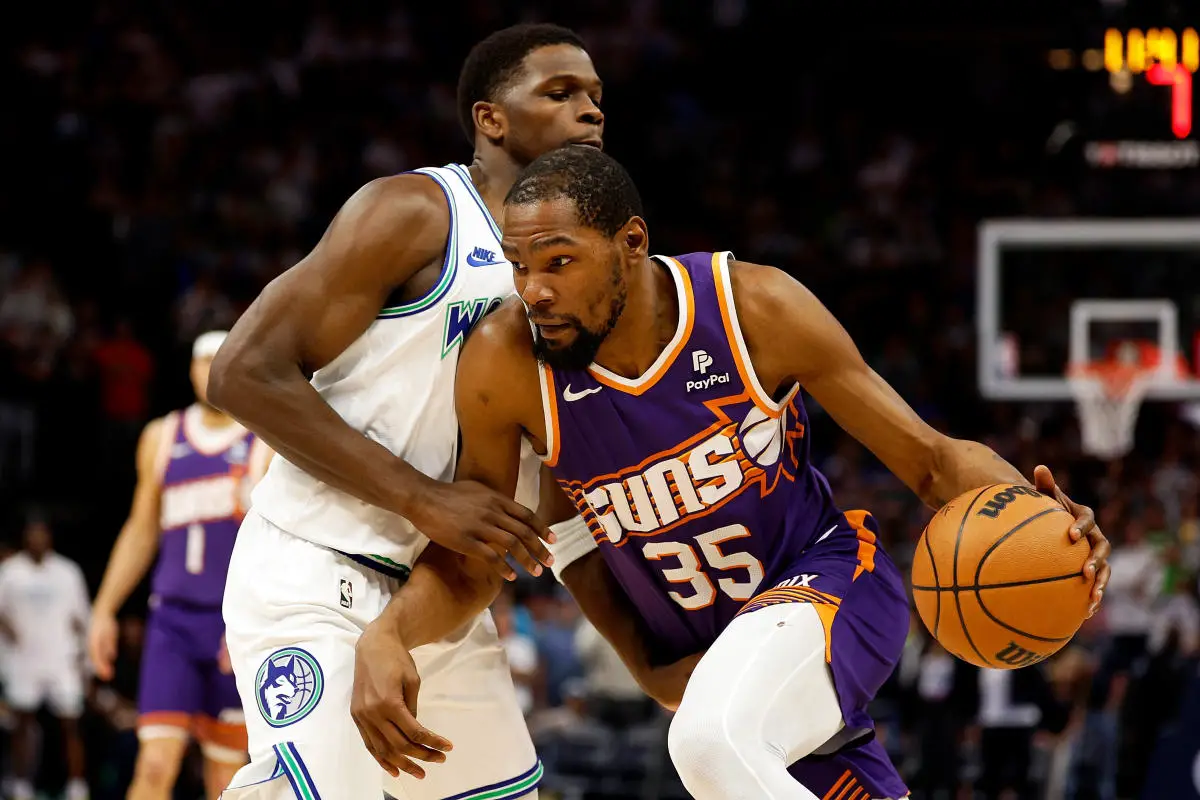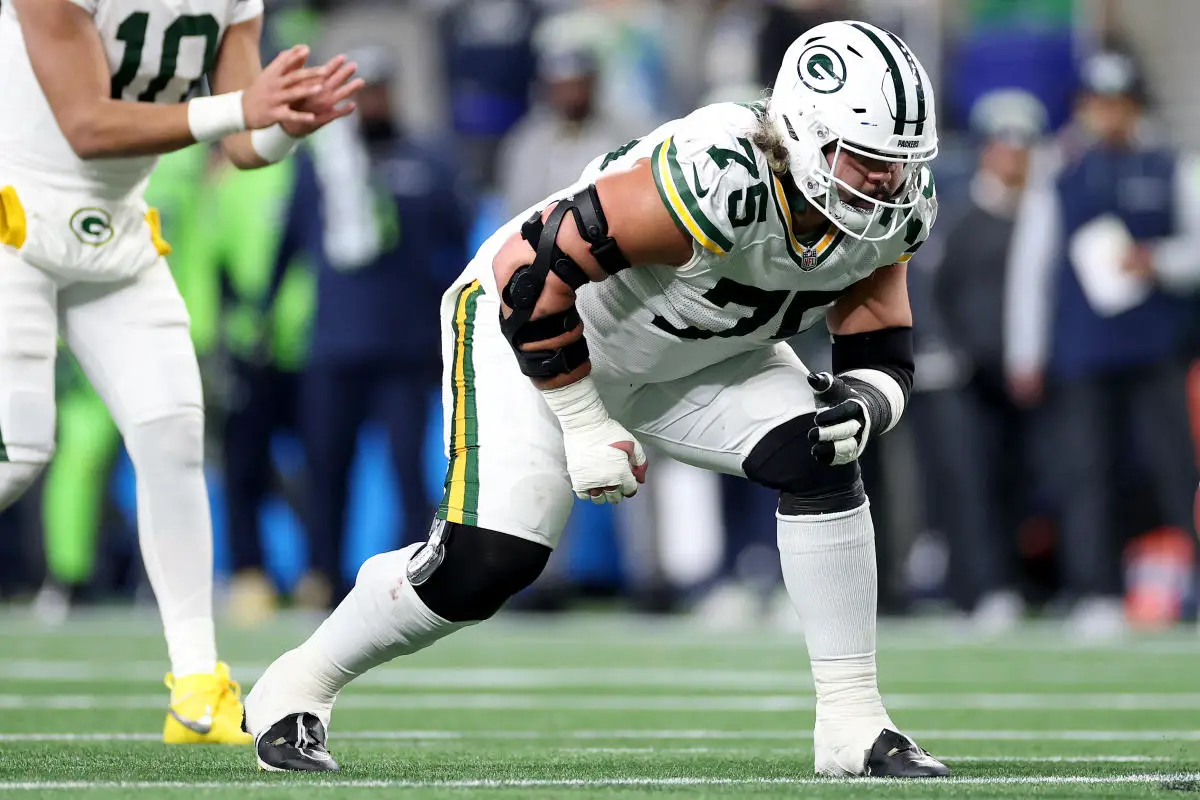
The Western Conference’s third-seeded Minnesota Timberwolves (56-26) and sixth-seeded Phoenix Suns (49-33) meet in the first round of the 2024 NBA Playoffs. The two franchises have never faced off in the postseason; let it never be said that there is nothing new under the sun. Or, I guess, the wolf.
By getting their do-over right.
You trade for Rudy Gobert because you want to get stops. And after an up-and-down first year, that’s exactly what the Timberwolves did this season.
The Wolves play huge: 7-footers Gobert and Karl-Anthony Towns (just returned from a torn meniscus) up front; the long and physical Jaden McDaniels and Anthony Edwards on the wing; even more size off the bench, headlined by Sixth Man of the Year candidate Naz Reid. Playing so big fueled big improvements in nearly every defensive category — including defensive efficiency, where the Wolves led the NBA in points allowed per possession.
“They beat us up,” Celtics All-Star Jaylen Brown told reporters. “… They were the first team that put that kind of pressure on us.”
At their best, they can apply that kind of pressure on the other end, too: Lineups featuring the rim-running Gobert, sweet-shooting Towns, ascendant Edwards and rock-solid point guard Mike Conley have scored 120.6 points per 100 possessions, which would’ve ranked third in the NBA over the full season.
Size, skill, a meat-grinder defense and two scorers capable of exploding for 50: that’s Minnesota’s recipe. It had an incredibly high regular-season floor. Now we get a look at its postseason ceiling.
How the Suns got here
By showing juuuuuuuust enough.
After losing to Denver in 2023’s second round with both Chris Paul (injury) and Deandre Ayton (insult) sidelined, Phoenix remade its roster by flipping CP3 and Ayton for Bradley Beal, Jusuf Nurkić and Grayson Allen. The plan: Team Kevin Durant and Devin Booker with a third All-NBA-caliber playmaker; go incinerate defenses. The results: somewhat mixed.
The Suns did win four more games than last season, did boast a top-10 offense, and did scorch opponents with Beal, Booker and Durant on the floor, scoring 123.3 points per 100 Big Three possessions — a tick above the Celtics’ NBA-best full-season mark. The issue: With injuries costing Beal 29 games, the trio didn’t take the floor together until the Suns’ 24th game of the season, at which point Phoenix was barely above .500. All told, Beal, Booker and Durant logged just 862 shared minutes together over 41 games — not enough to develop the sort of chemistry and flow that would elevate them to the top tier of a hyper competitive West.
The glass-half-full view: Phoenix escaped the play-in by going 7-3 in its brutal 10-game season-closing gauntlet — headlined, for our purposes, by beating the Wolves twice in 10 days, including Sunday’s regular-season finale.
Head-to-head
The Suns swept the season series, 3-0 — with three double-digit wins.
In mid-November, Durant and Booker combined for 62 points as the Suns scored 1.5 points per possession — Phoenix’s most efficient offensive performance of the season — in a blowout win:
On April 5, Phoenix turned in its best defensive performance of the season, holding Minnesota to just 38.8% shooting — Minnesota’s second-worst night of the year — for a comfortable W:
Minnesota goes Horns Chest, Suns switch the initial screen + great help from Nurkić
Everything offensively is flowing from defensive successes in this one
Allen is found in relocation after pressuring the paint, for 3 — 13-0 start for PHX pic.twitter.com/gW4T5kcq7L
— Stephen PridGeon ☯️🏁 (@StayTrueSDot3) April 6, 2024
And on Sunday — with Minnesota still having a chance to secure the West’s No. 1 seed on the season’s final day — a decisive start for Phoenix (16-for-24 shooting) and a dismal one from the Wolves (11 cough-ups in 12 minutes) led to a 22-point Suns lead after the first quarter. They kept the Wolves at arm’s length the rest of the way, with Beal turning in perhaps his best game as a Sun:
The Wolves allowed just 108.9 points-per-100 this season, according to Cleaning the Glass — the NBA’s best mark. Across three regular-season meetings, though, the Suns torched them to the tune of 129.3 points-per-100.
Maybe that’s the result of unsustainably hot shooting; maybe it’s a sign of a specific mismatch in Phoenix’s favor. Either way: It puts the higher seed on unsteady ground.
“Figure out a way to beat Phoenix,” Edwards said Sunday when asked about Minnesota’s mindset. “Because we ain’t been able to do it.”
Matchup to watch
How Phoenix defends Edwards.
As much difficulty as they had defensively against the Suns’ elite shooting, the Wolves had just as much trouble scoring against Frank Vogel’s squad. Minnesota scored just 102.7 points-per-100 across three losses to Phoenix — five full points below the league’s worst regular-season offense.
One big reason: Ant had a devil of a time against the Suns, averaging just 14.3 points per game — his lowest scoring average against any Western opponent — on 13-for-42 shooting (31%) from the field, with 11 assists and 10 turnovers.
The Suns load up aggressively on Edwards whenever he has the ball. When Edwards calls up a screener to run pick-and-roll, centers Nurkić and Drew Eubanks hedge hard to try to force the ball out of his hands. When he looks to attack his man — Beal or Allen, mostly, though Durant, Booker and Royce O’Neale have taken shifts — Phoenix has help defenders stationed in the gaps, and weak-side defenders peeled in early to make Edwards play in as much traffic as possible.
The result? Gridlock:
Edwards will counterpunch. He’ll vary his attack — hunting early offense in transition, launching pull-up 3s over Phoenix’s wall, cutting from the weak side after getting off the ball, hitting the offensive glass — in search of chances and rhythm.
If that rhythm continues to prove elusive, though, and if the Suns keep helping this aggressively, then Edwards will have to trust the pass … and his teammates will have to reward that trust. Non-Ant Wolves have shot just 21-for-71 (29.6%) from 3-point land against Phoenix this season; if that continues, Minnesota will struggle to keep pace.
Closing lineups
Minnesota Timberwolves
The Wolves’ commitment to hugeness persists late; Gobert-KAT-McDaniels-Ant-Conley is also their top fourth-quarter lineup. Reid and Kyle Anderson see a lot of fourth-quarter run, too.
But SloMo’s long-range reticence — he made 94 3-pointers in 2020-21; he took 48 this season — might render him unplayable against Phoenix’s hyper-aggressive help. And Towns and Reid, for all their virtues, might have a tough time defending cross-matches against Phoenix’s wings.
So: Keep an eye on Nickeil Alexander-Walker.
NAW has the length (6-foot-5, near 6-foot-10 wingspan), defensive chops (third among guards in defensive estimated plus-minus) and skill (39.1% on 3, 2.7-to-1 assist-to-turnover ratio) to make a difference in this matchup. Even, perhaps, at the expense of a centerpiece big man.
Phoenix Suns
While the Wolves are built on staying big and defending, the Suns make their bones by spreading you out with shooting. The Nurkić-Durant-Allen-Beal-Booker lineup has been both their most frequently used fourth-quarter group, outscoring opponents by 37 points in 76 final-frame minutes, and their best look against Minnesota overall — plus-35 in 27 minutes.
I’d expect O’Neale (in whose minutes Phoenix has outscored opponents by 9.4 points-per-100 since he came over from Brooklyn at the trade deadline) and Eric Gordon (who missed the season finale with a migraine) to factor into the mix, too. The Suns can’t match size with Minnesota; they’ve got to win with spacing, shooting and playmaking. Good thing, then, that they’ve got plenty of that.
Prediction
Suns in six. I’ve loved this Wolves team all season; I hate this matchup for them. The exact shots that Minnesota forces are the ones that Phoenix feasts on. As much as I trust Ant, and as sure as I am that Wolves coach Chris Finch will spend this week cooking up counters, I’m not sure I trust Minnesota’s shooters enough to short-circuit Phoenix’s defensive scheme. And for all the uncertainty over the Suns’ top guys getting and staying healthy, they’re healthy now. That gives Phoenix more pathways to points than Minnesota, and with them, a path to Round 2.
Series odds
Minnesota Timberwolves (-105)
Phoenix Suns (-115)
Series schedule (all times Eastern)
Game 1: Phoenix at Minnesota on Saturday (TBD)
Game 2: Phoenix at Minnesota (TBD)
Game 3: Minnesota at Phoenix (TBD)
Game 4: Minnesota at Phoenix (TBD)
*Game 5: Phoenix at Minnesota (TBD)
*Game 6: Minnesota at Phoenix (TBD)
*Game 7: Phoenix at Minnesota (TBD)
*if necessary






